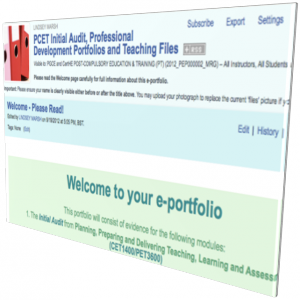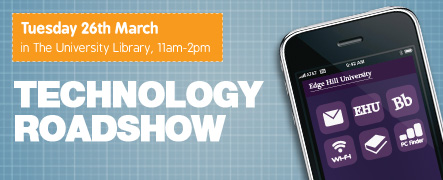
-
A Library of Answers
Technology Roadshow
Learning Services and IT Services are again joining forces to offer advice on the latest technology developments. We will be setting up a pop-up stall in the University Library where all your students can come along and ask us questions at the ‘Technology Roadshow’.
The aim of the Technology Roadshow is to demystify some of the things they’ve heard about but don’t know how to use, so they can get the best out of resources such as Learning Edge, the campus wifi, mobile apps and electronic library resources.
It is important we get the message out to as many students as possible. Learning Services is conducting a campaign to promote the event so that we reach as many students as possible, however you are by far the best resource we have in terms of letting students know about the event.
So please mention the Technology Roadshow to all your students so that they know where and when they can talk to us.
- The Technology Roadshow will be held in the University Library (11am – 2pm) on Tuesday 26th March.
For students working off campus or are unable to attend they can contact us during the event (and beyond) via our social media channels: Facebook and Twitter. We’ll be using the #EHUmobileclinic hashtag so if they have something to say or a question to ask about using technologies for their studies, they can get in touch.
If you are passing, why not take time to pop in and talk to us at the Technology Roadshow, who knows you might have questions too!
Martin Baxter – Learning Technology Development
-
Update for iOS users: Blackboard Mobile
It seems that iOS users have recently been experiencing a few issues with their Blackboard Mobile app.
Good news! A number of ‘bugs’ have now been fixed and the new version is available to download via the iTunes Store. You may have already installed the update, but just in case, you’re looking to have version 3.1.4 installed.
So, what does this mean? Well here’s just a few things that have been resolved:
- Fixed an issue with displaying large Microsoft Office and PDF files
- Fixed an issue with playing MP4 and MOV files
- Fixed an issue preventing users enrolled in multiple groups from accessing their groups
- Performance and reliability improvements to accessing, managing, and uploading files to and from linked Dropbox accounts.
- Enlarged the size of iPad Mobile Learn’s Audio Player window to prevent playback controls from being partially obscured on both Portrait and Landscape orientations.
- Improved file size listing to use KB, MB, and GB file size labels when displaying content greater than 100KB in size.
- Improvements to Mobile-Compatible Tests to improve reliability
There are many other minor fixes but we felt the ones above are the ones that will make the most difference to the user.
If you ever experience any issues with Blackboard Mobile, please let Learning Technology know by dropping us an email on [email protected] outlining the details of the problem. We’ll be able to take them forward to the Blackboard Mobile development team and hopefully you’ll see your suggestion or issue fixed in a future release.
Carol Chatten
Learning Technology Development Officer
-
Shifting portfolios online
How a ‘spark’ during a staff development session led to a fully ‘on-line’ portfolio for all PCET trainees.
Lindsey Marsh (Senior Lecturer, Faculty of Education) attended an early Campus Pack training session. During that session she realised that the wiki technology offered the potential to significantly improve trainees’ portfolios. This post is based on an interview with Lindsey on 8th Feb 2013 telling her story about how she implemented the electronic portfolio for the Post Compulsory Education and Training (PCET) course.
 Q: Can you tell me the history behind the PCET electronic portfolio?
Q: Can you tell me the history behind the PCET electronic portfolio?“I attended a staff development session that introduced Campus Pack (one of yours!). We were looking at how the administration team might be able to use the system to share course documentation with external staff, mentors, course representatives etc. and I had a ‘light bulb’ moment – realising that this system (Campus Pack) could be used for the trainees’ portfolios. This led to a complete redesign of the two modules, and moving the initial audit from the first module (PTTLs) and integrating it into their professional practice modules.
Q: What did you envisage?
“I envisaged a completely electronic portfolio that integrates all the personal and professional development of the trainee from pre-course (pre course workshops and skills audit) for both teaching portfolios – ‘digitally’ – all in one place – saving room and allowing both trainees and staff to find things quickly. Trainees now have links to video, audio, images, job applications, interview records and coursework in their electronic portfolios.
“Also note that the PCET tutors and mentors need to assess these portfolios regularly, so having these available on-line is a real benefit to everyone.”
Q: What was the ‘driver’ – what were you trying to fix / achieve?
“Trainees were producing two lever arch files of evidence for each of the modules. This of course meant that they had to lug them around along with their teaching resources. In terms of checking and marking, the tutors (including me) would have car boots full of lever arch files that took hours to go through, and mark, and sign, and comment on etc.. Having the portfolios available electronically means that the tutors didn’t need to carry anything around. I also realised that other people would be able to access the portfolios – asynchronously – which means that we’d be able to track engagement, how often the trainees are updating their action and development plans etc. We could also track how they are engaging with the other developmental work.
“I think the pivotal thing for me was the ability to ‘nip in and nip out’ – thus I now review trainees portfolios much more frequently than I used to with the paper based system – and this has also encouraged trainees to keep their portfolios more up to date – to be more of a ‘working document’.
“Personal tutors and Setting Subject Mentors (SSMs) can ‘nip in and nip out’ and mark with authenticated comments such as ‘yes, this is valid evidence, we did have those developmental meetings, this is the number of hours etc. Also, because the wiki tool in Campus Pack tracks who’s done what and when we can now say with even greater certainty that a verification comment from a PT/SSM really is from the PT/SSM.”
Q: What do the rest of the PCET team think about the new system?
“Most of the team really like it – they like that they can check their trainees progress and engagement at a time that is convenient to them rather than bringing a trainee on to campus on a day that they wouldn’t normally attend. A very small number of Personal Tutors have not been as confident as the technology required, and in those cases we have been very supportive, as we have been with SSMs in a similar position, and those tutors have come on board. The number of PTs that are struggling with the technology is reducing very quickly.
“Note that we’ve decided as a team that any trainee that started from Sep ’12 MUST have an electronic portfolio – but they can always maintain a paper based portfolio for their own purposes.”
Q: What problems have you experienced implementing the new system?
“Trainees not following instructions accurately: Very early on we noticed that some trainees managed to enter information into the master template – thus we had to change some permissions. Also some other trainees didn’t give all the ‘Permissions’ (ability to edit a wiki) as they were instructed – again, something very quickly fixed. In fact, I’ve got lots of support documentation with detailed explanations that I send out to trainees as these issues arise.”
Q: How significant were these issues to the trainee experience?
“I usually manage to respond to trainees very quickly – often resolving any problems within 12 hours of them being reported.”
Q: What do the trainees think about the new system:
“Generally trainees like:
- not having to lug heavy files around;
- getting feedback at ‘random’ or quick intervals;
- tutors tagging pages with ‘complete’ or ‘needs attention’.
“To illustrate one issue, I went to see a couple of trainees that were having difficulties with the online portfolio last week. The problem was they couldn’t picture / visualise the portfolio. So I gave them a paper based index – and now they are saying ‘I love the e-portfolio now’.”
Q: What support have you put in place for the students?
“I’ve created a range of ‘How To’ resources with annotated screen shots and accessible language that are aimed at trainees, PTs and SSMs.”
Q: What advice would you give others thinking of creating an e-Portfolio system?
- Plan: plan, plan and plan again!
- Get feedback from colleagues who are going to be involved – DETAILED feedback – don’t rely on a quick look from someone;
- Discourage the uploading of scanned documents – trainees can quickly reach their storage quota with these huge documents – if you need to scan a signed document then perhaps just scan the signature page and add that to the end of the rest of an electronic document;
- The devil is in the detail – the TINY details that should be been picked up if there is a robust examination prior to publishing, perhaps by ‘walking through’ the whole life cycle as both a member of staff and a student*.”
Lindsey Marsh
Senior Lecturer PCET
Faculty of Education
PCETWhat impressed me most about Lindsey’s story is that the students who haven’t experienced the paper portfolio are NOT ‘gushing’ about how easy it is to access, distribute, or copy – they have nothing to compare the e-portfolio with. The result is that this innovative technology has been ‘backgrounded’ – thus the trainees are fully focused on the content – just as it should be!
For further help, support and advice on how you can use Campus Pack and other Web 2.0 style tools with your students contact your Learning Technologist (see the Faculty Contacts on this page) or email the LTD Team on [email protected]. Further – click here for LTD’s video introduction to Campus Pack.
David Callaghan, 26th February 2013
* LTD’s guide to using your Test Student account in Blackboard




